牛津英语6年级 第六课 课文翻译 习题 及语法
六年级上册英语Unit 6 Holidays 牛津译林版
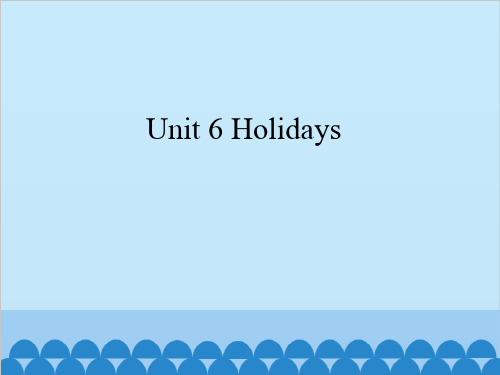
Uis it?
假日乐趣
[ˈhɒlədeɪ]假日,节日 What is your favourite holiday?你最喜爱的节日是什么?
It’s….
National Day
['næʃ(ə)nəl]
国庆节
[keɪm ]回来
The students came back to school after
What did Mike do for the National Day holiday?
Mike went to a _f_a_r_m___. He picked some o_r_a_n_g_e_s_. He went _fi_s_h_in__g_ too. He caught __a_b_i_g_f_i_sh____.
Star Lake. We picked some oranges and went fishing. Liu Tao: Did you catch any fish? Mike: Yes, I did. I caught a big fish! Liu Tao: That’s great. Why did you call me? Mike: Because I wanted to give you the fish. Liu Tao: Where’s the fish now? Mike: I ate it!
牛津版英语六年级下册unit 6
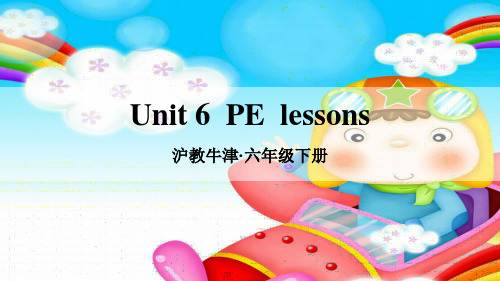
OK.
Language points
The swimsuit should not be too big or too small. 游泳衣不应该太大,也不应该太小。 此句是含有情态动词should的句型。 句型结构:主语+should+动词原形+其他.
(1)变否定句时在情态动词should后+not You should not do it after supper. 晚饭后你不要这样做了。
(2)变一般疑问问时,将should 移到句首。 Should I read books here? 我应该在这读书吗?
Do a survey
What is your favourite activity in PE lessons? Ask and answer the question with your classmates.
频度副词sometimes在句中的位置很灵活,可以放 在be动词、助动词之后,行为动词之前,也可以放在句 首,还可以放在句尾。
有时候,我们乘公汽上学。 _S__o_m__e__t_im__e__s__w__e__g_o__t_o__s__c_h_o__o_l__b_y__b_u__s_.___
有时候我帮助妈妈干家务活。 S__o__m__e_t_i_m__e_s__I_h__e_l_p__m__y__m__o__th__e_r__w__it_h__t_h__e__h_o__u_s_e__w__o_r_k.
like后接动词时可接动词不定式或动词-ing形式, 意为“喜欢做某事”。
He likes ___p_l_a_y_in__g___(play) soccer. 他喜欢踢足球。
3.Jill is good at the high jump. 吉尔擅长跳高。
牛津译林苏教六年级英语上Unit6 Keep our city clean story time课

rubber
bin垃圾箱
rubbish垃圾
We can(可以) put rubbish in the bin.
Let’s talk
Rubbish makes the street dirty and
messy.
not tidy
at sixes and sevens 凌乱的 / 乱七八糟
The third stop
Discussion
Q1 What makes our city dirty ?
makes
dirty.
Tip: 1, 小组讨论,注意帮助谈论有困难的同学。 2,可以对其他组进行提问和补充。
Let’s read
Miss Li: Look at these pictures of our city. Is our city clean?
汽车尾气
What makes our city dirty?
什么使我们的城市变脏?
Smoke from cars
Rubbish
bins
ቤተ መጻሕፍቲ ባይዱ
Rubbish in water and dead fish
factories
Watch and think
1、Is the city clean? 2、What makes the air dirty? 3、What makes the streets messy and dirty? 4、Is the river dirty?
5. We can plant more trees.
种植
Tips:阅读全文,完成下列填空。
messy air bin factories move walk rubbish fish bus smoke trees
牛津译林新版6Aunit6知识点与练习

Unit6 Keep the city clean课本内容知识点讲解:“继续”的意思,后面加动词ing形式,即keep+doing;作为系动词时,表示“保留”的意思,后面跟形容词,即keep+sth+adj(形容词)2.clean表示动词含义为“清扫”,例如:clean the classroom ,表示形容词含义为“干净的”,同义词tidy,反义词dirty3.What makes our city dirty ? 这句话要注意:首先what后面的make应该用三单,第二点make表示含义为“使....”make后面加动词为原型,即:make+do+sth ;后面加形容词为“make sb +adj 意为:使某人怎么样4.smoke 作为动词表示“吸烟”,No smoking! ;表示名词意为“烟雾”,为不可数名词,不可数名词或可数名词单数的be动词都用is或was,实意动词用三单。
5.Smoke from cars makes the air dirty.这儿makes用三单形式,是因为smoke是不可数名词,跟cars无关,因为使空气变脏的是车子排出烟雾,而不是车子。
6.Factory意为工厂,复数形式:因为是辅音字母加y结尾的,去y变ies.7.Rubbish 意为垃圾,为不可数名词,垃圾桶为“dustbin”8.Messy意为混乱的,为形容词,它的名词形式为“mess“,常用词组“in a mess”.9.dead为形容词,意为“死亡的”,例如:a dead bird .动词形式为:die; 名词形式为“death”10.What can we do to keep our city clean? 中文意思为“我们能做什么去使我们的城市干净?”这儿在do与keep之间加了个to,表示目的,这儿注意“to”不能省略。
11.Walk to school 走路去学校walk home 走路回家,home前不能用介词to,但是可以用其他介词,比如说:at home12.Move....away 把.....移走keep.....away 使.....远离13.put....in.....把.....放进.....14.Plant trees 植树,在这儿plant 为动词,种植的意思,plant 作为名词含义为“植物”15.Well done。
六年级英语上册第六课

Revision
words:
• • • • • • • • rise [raiz] 升起 east [i:st] 东方,东部 here[hiə] and there[ðɛə] 到处 world [wə:ld] word [wə:d] 世界 high [hai] 高的 higher [haiə] 更高 than [ðæn] 比……更 cloud [klaud] 云
words:
• • • • • • • • rise • east • here and there • world • high • higher • than • cloud • 升起 • 东方 • 到处 • 世界 • 高的 • 更高 • 比…更 • 云 • hide • bright • • traveller earth • night • never • stop • tired • 躲藏 明亮的 旅行者 地球 夜晚 从不 停止 疲劳的
0 1 2 3 4
Yes,it is.
Yes,I can.
There are no cloruds and the sky is blue. • Does the earth travel all day and all night nitht? Yes,it does. • Who is never tired and never stops? The sun. 6
words:
• • • • • • • • hide [haid] bright [brait] traveller [‘trævələ] earth [ə:θ] night [nait] never [‘nevə] stop [stɔp] tired [‘taiəd] 躲藏,隐蔽 明亮的 旅行者 地球 夜晚,夜间 决不,从不 停止 疲劳的,厌倦的
牛津译林版六年级Unit 6 keep our city clean---make,keep,can

情态动词can的基本用法
2.表示“可能”,常用于否定句或疑问句中,指某 种可能性。
例如: Han Mei can’t be in the classroom. Can he come here today, please?
情态动词can的基本用法
3.表示“可以”,常用于口语中,指许可或请求 做某事。
1. Let him do whatever he wishes to do.
他想干什么就让他干吧。
2. Did you see him go out?
你看见他出去了吗?
知识呈现:
IV. “make+宾语+V-ed(过去分词作宾补)”这 个结构指宾语接受后面的那个动作,表示被动的 意思,意为 “使某人 / 某事被……”。
C. Sorry, I can’t make it
D. Sorry, I’m not available
today
2. (2012•江西卷)We were all agreed that the cottage would
_______a perfect holiday home for the family.
习题精选:
1. (2013•陕西卷)---Shall we go for a drink at one o’clock this
afternoon?
---_______. Will two o’clock be OK?
A. Sure, it’s up to you
B. Sure, no problem
Read and answer
1. What makes the streets messy and dirty?
2. Why the fish in the river are dead?
Unit 6 Period 1 Grammar 课内语法精讲-六年级英语上册(牛津上海版)

6. It takes sb. + 时间 + to do sth. 做某事花了某人多少时间 It took me half an hour to go over my lesson. 复习功课花了我半个
小时。 = I spent half an hour on my lesson.
7. a few, some, a lot of a few一些;some一些;a lot of许多 这些都是表示数量的单词或短语。a few用来修饰可数名词,表示肯定,意为“少数的;几 个;一些”。例如: I have a few books. 我有一些书。 some是不定量代词,意为“一些”,既可以修饰可数名词,也能修饰不可数名词,常用于肯 定句,当用在特殊疑问句中时表示渴望得到对方的肯定回答。例如: I'd like to have some milk for breakfast. 早餐我想喝一些牛奶。 -Would you like some water?你想要喝水吗? -No, thank you. 不,谢谢。 a lot of是一个形容词性短语,意为“许多,大量”,修饰可数名词或不可数名词,常用于肯 定句中。例如: There are a lot of trees in this park. 这个公园里有大量的树。 Tom earns a lot of money by hard work. 汤姆通过努力工作挣了许多钱。
Unit6 Going to school
1. be/live near some place 离/住得离某地近 My school is
_______ my home. 我家离学校很近。 I live _______ my
school. 我住得离学校很近。【答案】near
牛津上海版英语六年级上册Unit6知识点及语法点
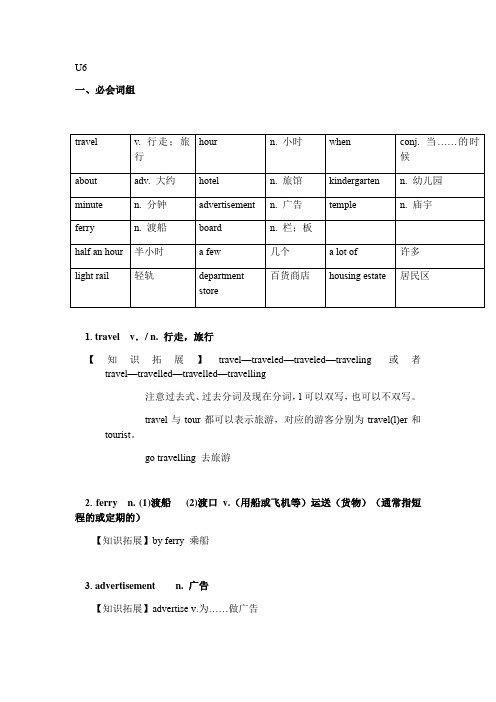
U6一、必会词组1. travel v./ n. 行走,旅行【知识拓展】travel—traveled—traveled—traveling或者travel—travelled—travelled—travelling注意过去式、过去分词及现在分词,l可以双写,也可以不双写。
travel与tour都可以表示旅游,对应的游客分别为travel(l)er和tourist。
go travelling 去旅游2. ferry n. (1)渡船(2)渡口v.(用船或飞机等)运送(货物)(通常指短程的或定期的)【知识拓展】by ferry 乘船3. advertisement n. 广告【知识拓展】advertise v.为……做广告4. board n. 栏;板【知识拓展】abroad adv. 在国外,到国外。
broad adj. 宽广的。
形象记忆board这个单词:首尾bd两个字母想象成船头和船尾,中间oar是一个单词,意思是“桨”,所以board有“甲板,上船”的意思。
5. a few 几个。
a few只能修饰可数名词复数形式,与之对应的是a little, 只能修饰不可数名词。
练习:I.Read and complete the sentences.(根据给出的首字母,完成句子。
)1. I have been to Jing’an T .It's in the centre of Shanghai.2. My father’s office is far away from home. He goes to work by l r every morning because it is fast.3. Mum likes going to some department s at weekends.4. We live in a new h e . It's large and beautiful.keys: 1.Temple 2.1ight rail 3.stores 4.housing estate 【乘坐交通方式表达】乘坐交通工具的表达:by bus/by car/by underground/by bike/by plane/by ferry /on foot乘公共汽车/乘小汽车/乘地铁/骑自行车/乘飞机/乘轮渡/步行。
牛津英语6年级 第六课 课文翻译 习题 及语法
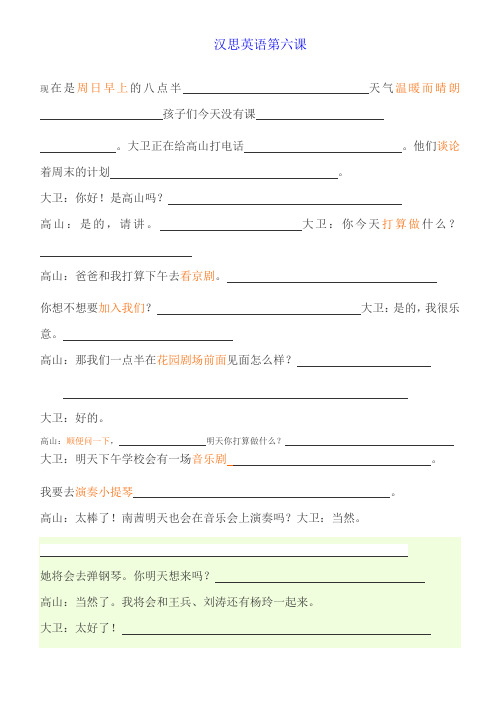
现在是周日早上的八点半天气温暖而晴朗孩子们今天没有课。
大卫正在给高山打电话。
他们谈论着周末的计划。
大卫:你好!是高山吗?高山:是的,请讲。
大卫:你今天打算做什么?高山:爸爸和我打算下午去看京剧。
你想不想要加入我们?大卫:是的,我很乐意。
高山:那我们一点半在花园剧场前面见面怎么样?大卫:好的。
高山:顺便问一下,明天你打算做什么?大卫:明天下午学校会有一场音乐剧。
我要去演奏小提琴。
高山:太棒了!南茜明天也会在音乐会上演奏吗?大卫:当然。
她将会去弹钢琴。
你明天想来吗?高山:当然了。
我将会和王兵、刘涛还有杨玲一起来。
大卫:太好了!三.根据句意思填入单词的正确形式:1. A:What are you going to go tomorrow?B:I’m going to _______ (play) computer games.2. Wang Bing ______ (want) to go shopping with his friends.3. _____ Su Hai and Su Yang going to pick apples?4. _______ they often call their grandparents?5. We are ________ (have) supper now.6. Look ! My sister _________ ( play ) with the toy cars .7. I _______ ( get ) up at 6:30 every morning .8. Do they like ________ (swim) ?9. Tom’s mother _______ (have) a nice jacket .10. Can you _______ (make ) a paper plane for me ?四、选择填空。
( ) 1. ________ some orange juice in the bottle.A. There isB. There areC. There has( ) 3. ‘Be quite ‘means you _______ make noise here.A. shouldB. shouldn’tC. can( ) 4. —Happy birthday, David. This present is for you. —________ .A. Not at all.B. Thank youC. You’re welcome.( ) 5.I _________ a Beijing opera last year.A. seeB. watchedC. saw五.翻译句子1、A:你在劳动节准备做什么?B:我准备a paper plane去远足。
译林牛津英语六年级上册6A Unit6 Grammar time&Fun time

S4: W3.eStciacnk y…our ideas.
S5: We can …
Ss: L4e.tP’sretrpyaoreuryobuerstshtoowke. ep our school
clean and beautiful!
1. 继续完成海报的制作。
2. 仿照例文,写一段保持校园整洁 的短文,并整理成演讲稿。
Two little blackbirds sitting on the hill, One named Jack and one named Jill. Fly away, Jack. Fly away, Jill. Come back, Jack and come back, Jill. Two little blackbirds sitting on the hill, One named Jack and one named Jill.
from our city
We can
What can we do to keep our city clean?
We can take the bus and metro to school. We can walk to school We can move some factories away from our city. We can put rubbish in the bin. We can plant more trees.
Can you make?
Ss: H小e贴ll士o,Meavkeinrygotinpse:! This is our poster!
S1: W1.hSahtacreanyowuer didoetaos.keep our school
Unit6小学英语六年级上册课文翻译知识点
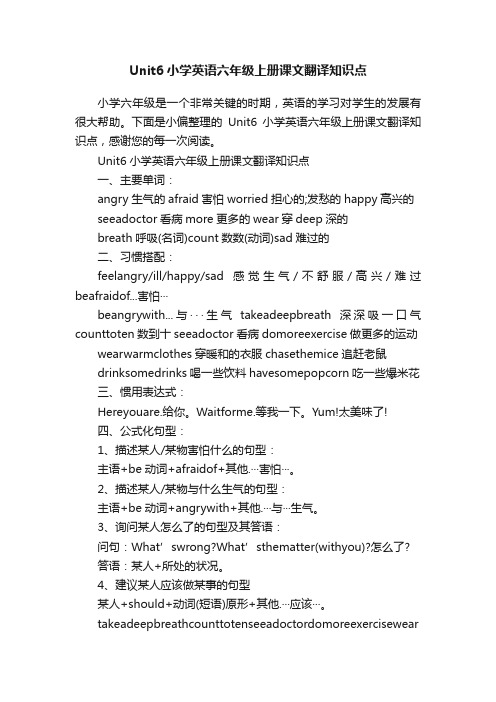
Unit6小学英语六年级上册课文翻译知识点小学六年级是一个非常关键的时期,英语的学习对学生的发展有很大帮助。
下面是小偏整理的Unit6小学英语六年级上册课文翻译知识点,感谢您的每一次阅读。
Unit6小学英语六年级上册课文翻译知识点一、主要单词:angry生气的afraid害怕worried担心的;发愁的happy高兴的seeadoctor看病more更多的wear穿deep深的breath呼吸(名词)count数数(动词)sad难过的二、习惯搭配:feelangry/ill/happy/sad感觉生气/不舒服/高兴/难过beafraidof...害怕···beangrywith...与···生气takeadeepbreath深深吸一口气counttoten数到十seeadoctor看病domoreexercise做更多的运动wearwarmclothes穿暖和的衣服chasethemice追赶老鼠drinksomedrinks喝一些饮料havesomepopcorn吃一些爆米花三、惯用表达式:Hereyouare.给你。
Waitforme.等我一下。
Yum!太美味了!四、公式化句型:1、描述某人/某物害怕什么的句型:主语+be动词+afraidof+其他.···害怕···。
2、描述某人/某物与什么生气的句型:主语+be动词+angrywith+其他.···与···生气。
3、询问某人怎么了的句型及其答语:问句:What’swrong?What’sthematter(withyou)?怎么了?答语:某人+所处的状况。
4、建议某人应该做某事的句型某人+should+动词(短语)原形+其他.···应该···。
最新牛津译林版六年级英语上册(6A)Unit6 Keep our city clean (第3课时)
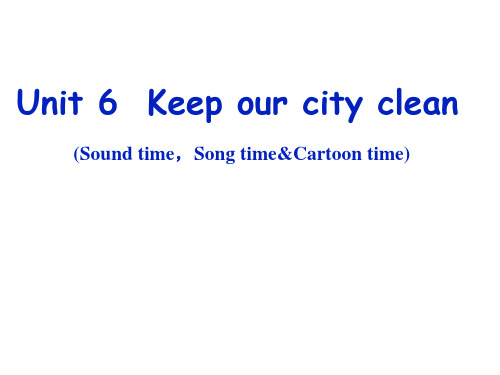
Unit 6 Keep our city clean
(Sound time,Song time&Cartoon time)
Many years ago, we have a beautiful and clean home.
小鸟的心愿
We want to come back.
But now, it is dirty here.We have to fly away.
2
What can we do to keep our city clean?
We can …
put rubbish in the bin
walk to school take the bus and the metro to school
plant more trees
move some factories away from our city
3 Make a green plan to keep the place clean.
1
Talk show
What makes the city dirty? ... makes ...
smoke from cars
dead fish
rubbish
black smoke from factories
It makes the streeห้องสมุดไป่ตู้ messy.
最新牛津译林版六年级英语上册(6A)Unit6 Keep our city clean Period2
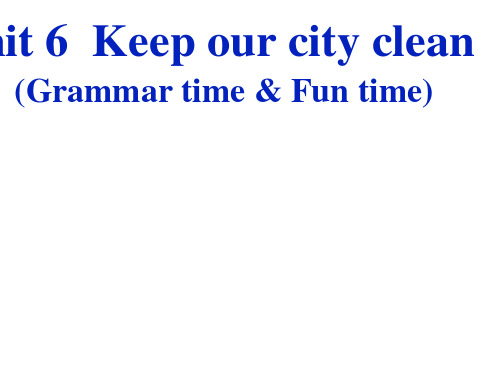
noisy
吵闹的
messy
smelly
dusty 发臭的
多灰尘的
What makes our city …?
…makes our city…?
smelly
rubbish waste paper
发臭的
noisy
dusty
吵闹的
多灰尘的
cars
trucks(卡车) people
crowded
拥挤的
messy
Read the phrases loudly
make them sleepy make the children happy
keep the cmhamilmkdmameramekmmakatenhkaeaakeekomqekkteuhueeibetureioiehticstatchttsleteinseolttreyrahgxnecsrocrgcbehyairltetietdeladdaduintrtitriyfeudl make the water cold
亲爱的读者: 2、仁千世者里上见之没仁行有,绝智始望者于的见足处智下境。,二只20〇有20二对年〇处7月年境1七绝4日月望星十的期四人二日。二20〇20二年〇7月年1七4日月星十期四二日2020年7月14日星期二 春亲去爱春的又读回者,:新桃换旧符。在那桃花盛开的地方,在 3、为少成中年功华易都之学永崛老远起难不而成会读,言书一弃。寸,光放20阴弃:28不者7可永.14轻远.2。不02。会02成0功:28。7.14.202020:28270.1:248.2:300270.2104:.22802200:208:23807.14.202020:287.14.2020
绿色小医生来诊治!
两人一组做绿色医生, 针对上述情况,开处方。
牛津沪教版六年级上6A-Unit 6知识点梳理 + 拓展阅读

Unit 6 Going to school知识点梳理I. Useful words and expressions1. – How do you go to school.– I go to school on foot /by bus.how用于对交通方式的提问。
I go to school on foot. = I walk to school.I go to school by bus. = I take a bus to school.2. It takes me about half an hour to get there.half an hour 半小时。
get to 到达,后接here, there, home等词时要省略to。
get there 到达那里。
3. I go to school by bus, then on foot.then在这里表示“然后”,表现出做事的先后顺序。
II. Word studyadvertise v. 刊登广告→advertisement n. 广告factory n. 工厂→factories n. 工厂(复数)III. Language explanation1. – How long does it take to get to the supermarket?– It takes me ten minutes to get there.How long 用于对时间长短的提问, “多久”,“多长时间”。
It takes sb. some time to do sth. 花费某人多长时间去做某事。
= Sb. spend some time on sth. / (in) doing sth.e.g., It takes me about an hour to finish my homework every day= I spend about an hour on / (in) finishing my homework every day.It takes sb. some time to do sth 此句中,sb如果是代词,必须使用宾格形式。
上海牛津六年级上教材梳理及练习 Unit6(无答案)

Unit6二、词汇Words1. travel v. 行走,旅行n. 旅行e.g. My grandpa traveled a lot when he was young. 我爷爷年轻时经常旅行。
e.g. -What’s this book about? 这本书是关于什么的?-It’s about travel. 是关于旅游的。
[记忆链接] traveller n. 旅行者;游客traveling n. 旅行(作主语)e.g. The traveller in red dress comes from America.穿红连衣裙的那位旅客来自美国。
2. about adv. 大约prep. 关于e.g. It’s about two hours. 大约两小时。
e.g. -What’s the film about? 这部电影是关于什么的?-It’s about the environment. 是关于环境的。
3. minute n. 分钟n. 片刻;一会儿e.g.-What time is it now? 现在几点?-Three minutes past five. 五点零三分。
e.g.-Shall we go now? 我们现在走吗?-Wait a minute. I’ll close the window. 稍等片刻,我要关上窗户。
[辨析] ten minutes 提问用How long; ten minutes’walk 提问用How far[常见词组] ten minutes’ walk 十分钟的路程4. advertisement n. 广告e.g. I think it’s a perfect advertisement. 我认为这是一个非常好的广告。
[记忆链接] advertise v. 做广告advertising n. 广告宣传,广告业e.g. He works in advertising. 他从事广告业。
牛津译林版六年级英语上册Unit6知识点汇总

牛津译林版六年级英语上册Unit 6 知识点整理汇总I词组1. live near/ far away from2. go to ... by bus / ferry / underground=take a(n) bus / ferry / underground to ... 3. go to ... on foot = walk to ...4. How long does it take sb. to do sth.?=How long do/does sb. spend (in) doing sth.?5.It takes sb. some time to do sth.=sb. spend(s) some time (in) doing sth.6.about half an hour7.one hour and a half=one and a half hours8.the amount of time9.an advertisement board10. a few department stores=some department stores11.a little pollution = some pollution12.a lot of = lots of 否认形式: not much / not many13.on the bus / train / underground14.in the car15.on one ’ s way to sp.16.one one ’ s way home / there/ here17.by light rail18.in the housing estate19.at the police station20.get to sp./ get there住的离近/远乘公交车 /渡轮 /地铁去某地步行去某地某人花多少时间做某事?某人花(时间)做某事大概半小时一个半小时时间的量一个广告牌一些百货商铺一些污染很多在公交车 /火车 /地铁上在小轿车里在某人去某地的路上在某人回家 /去那边 /来这儿的路上乘轻轨在居民区里在警察局抵达某地/ 到那边II. 词性变换1. travel v. (travelled, travelled, travelling)traveller n. 旅游者A traveler is a person who is on a trip or a person who travels a lot.旅游者是一个人正在旅游或许一个人旅游好多。
(新版)牛津版六年级英语上册《Unit6Keepourcityclean》1
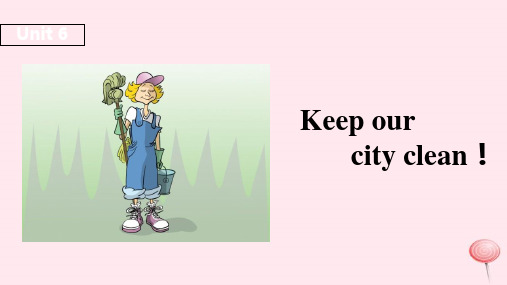
eg : Look at the sky, it’s very blue. 看看天空,非常蓝。
小练习 : ___A___the flowers. What beautiful flowers! A. Look at B. Look
Expressions
What makes our city dirty? 什么是我们的城市变脏?
make...dirty使......变脏。 make sth.+adj表示某物是怎样的。 eg: who makes our city dirty?
谁把我们的城市变脏? 小练习 : What ___B___our house clean?
朋友越多,生活越快乐。 小练习: us,let,more,do,exercise (.) _____________L_e_t_u_s_d_o__m_o_r_e_e_x_e_r_c_is_e_.____________
Expressions
Look at these pictures of our city. 看我们城市的这些照片。
•
15、一个人炫耀什么,说明他内心缺 少什么 。。202 1年4月 2021/4 /22021 /4/2202 1/4/24 /2/2021
•
16、业余生活要有意义,不要越轨。2 021/4/ 22021/ 4/2April 2, 2021
•
17、一个人即使已登上顶峰,也仍要 自强不 息。202 1/4/22 021/4/2 2021/4 /22021 /4/2
•
9、 人的价值,在招收诱惑的一瞬间被决定 。2021/ 4/22021 /4/2Fri day, April 02, 2021
牛津译林版(三年级起始) 六年级上册 Unit6 Keep our city clean
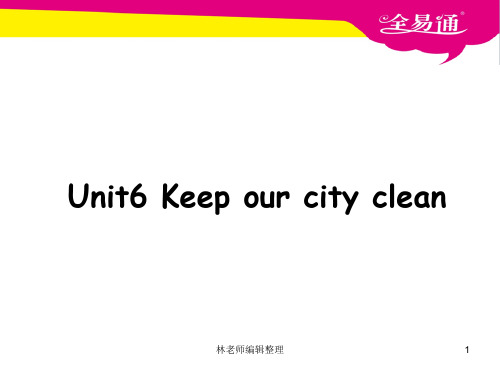
When we are destroying our environment, at
the same time, it is also bad for our bodies.
当我们正在破坏环境时,我们的身体也不再
健康。 林老师编辑整理
34
Don’t throw any rubbish onto the ground. Don’t waste
factories
the metro
rubbish trees
垃圾桶
更多的
林老师编辑整理
21
Read in groups
小组内自己确定朗读方式,可以是齐读,组 长带读,分角色读。(要求大声朗读,放下书本, 试着边演边读,你可以做得更好)
Intensive Reading Skills (精读技巧):
Yes, it’s dirty.
Rubbish makes the river dirty.
林老师编辑整理
16
What can we do to keep our city clean?
我们能为保持城市干净做些什么?
We can….
林老师编辑整理
17
Task 4. Listen and answer:
Unit6 Keep our city clean
林老师编辑整理
1
林老师编辑整理
2
What city do the birds like ?
林老师编辑整理
3
Is the city clean ? Yes,it is. 干净的,整洁的
The _riv_e_r is clean.
The _a_i _ is clean.
rubbish in the water and
- 1、下载文档前请自行甄别文档内容的完整性,平台不提供额外的编辑、内容补充、找答案等附加服务。
- 2、"仅部分预览"的文档,不可在线预览部分如存在完整性等问题,可反馈申请退款(可完整预览的文档不适用该条件!)。
- 3、如文档侵犯您的权益,请联系客服反馈,我们会尽快为您处理(人工客服工作时间:9:00-18:30)。
现在是周日早上的八点半天气温暖而晴朗
孩子们今天没有课。
大卫正在给高山打电话。
他们谈论着周末的计划。
大卫:你好!是高山吗?
高山:是的,请讲。
大卫:你今天打算做什么?高山:爸爸和我打算下午去看京剧。
你想不想要加入我们?大卫:是的,我很乐意。
高山:那我们一点半在花园剧场前面见面怎么样?
大卫:好的。
高山:顺便问一下,明天你打算做什么?
大卫:明天下午学校会有一场音乐剧。
我要去演奏小提琴。
高山:太棒了!南茜明天也会在音乐会上演奏吗?大卫:当然。
她将会去弹钢琴。
你明天想来吗?
高山:当然了。
我将会和王兵、刘涛还有杨玲一起来。
大卫:太好了!
三.根据句意思填入单词的正确形式:
1. A:What are you going to go tomorrow?
B:I’m going to _______ (play) computer games.
2. Wang Bing ______ (want) to go shopping with his friends.
3. _____ Su Hai and Su Yang going to pick apples?
4. _______ they often call their grandparents?
5. We are ________ (have) supper now.
6. Look ! My sister _________ ( play ) with the toy cars .
7. I _______ ( get ) up at 6:30 every morning .
8. Do they like ________ (swim) ?
9. Tom’s mother _______ (have) a nice jacket .
10. Can you _______ (make ) a paper plane for me ?
四、选择填空。
( ) 1. ________ some orange juice in the bottle.
A. There is
B. There are
C. There has
( ) 3. ‘Be quite ‘means you _______ make noise here.
A. should
B. shouldn’t
C. can
( ) 4. —Happy birthday, David. This present is for you. —________ .
A. Not at all.
B. Thank you
C. You’re welcome.
( ) 5.I _________ a Beijing opera last year.
A. see
B. watched
C. saw
五.翻译句子
1、A:你在劳动节准备做什么?B:我准备a paper plane去远足。
What ______ you _______ _______ do ____ May Day?
I’m going to _____ _______ ________ _________.
2.刘明和王璐在儿童节准备做什么?B:他们准备看京剧。
What _______ Liu Ming and Wang Lu going to do ?They are going to _____ ______ ______ _______
.
3.A:他在今天准备做什么?B:他准备去看演出。
What ________ he going to do ? He’s going to _____ _ __ ___ __ ___.
4.A:我们今天下准备做什么?B:我们准备去野餐。
What______ we going to do this afternoon? We are going to ______ _______ _______.
5.A:她准备去参加歌唱比赛吗?B:是的,她是。
What is she going to ______ ______ ______ a _______ ______.
Yes, she is .
6.A:他们准备参加运动会吗?B:不。
What are they going to ______ ______ _______ a _______ _______.
No, they aren’t.
本单元的语法是一般将来时
基本构成: 主语 + be动词 + going to do 否定句: 主语 + be动词 + not + going to do
一般疑问句: be动词 + 主语 + going to do?
肯定回答和否定回答: Yes, 主语 + be动词. /No, 主语 + be动词 not.
特殊疑问句: (Who/whose/which…..) + 主语 + be动词 + going to do?
1.sunny 名词形式 sun
2.children 单数形式 child
3.call sb. or call+ 人名,打电话给某人(人称代词要用宾格)
4.talk about their plans for the weekend
talk about sth. 谈论某事 plan for sth. 为……的计划
5.Would you like to + 动词原形? -- 你想/愿意做。
?
6.join us 加入我们(us 是 we的宾格,动词后面的人称代词一定要用宾格形式)
7.I’d == I would
8.Shall we + 动词原形?我们做。
好吗?
9.at one thirty 在一点半
在几点钟,要用介词 at
e home, go home 在这个词组里,home是副词,前面不要加任何介词.
play + 球类名词
play + the + 乐器名词
activity 复数形式 activities
11.at the bus stop 在汽车站 ,注意用at
12.It’s from Africa. be from 来自 = come from
在周日早上温暖而晴朗谈论
他们的计划看京剧上学
加入我们花园剧场前面顺便问一下
音乐剧演奏小提琴.当然
Play computer games. a paper plane
野餐歌唱比赛在。
前面
see a play 看表演野餐去远足
放学后
below 在…下面—above在…上面watch a race 观看竞赛take part in 参加….singing contest 唱歌比赛 at the concert 在音乐会上
sports meeting 运动会 Come with 跟。
来
tell sb. about sth. 告诉某人关于某事
how about = what about , 后面可以跟名词或动名词
see sb.拜访某人 conversation with st. 和某人的谈话( conversation 谈话,是名词)
talk to /with sb. 和某人说话
一些打电话的日常用语:
你想要找某人听电话,可以说:May I speak to …? / May I speak with…?/ I would like to speak to…
当你想问接听电话的人是某人时,可以说:Is that/this ....speaking?
当你就是对方要找的人时,可以说:Speaking. / This is …speaking. /…speaking.
当你想告诉对方你是谁是,可以说:This is …speaking. / This is …
当对方打错电话时,可以说:Sorry, wrong number.
当对方找的人在时,可以说:Hold on, please.
当对方要找的人不在时,可以说:Sorry, he/she is not here. May I take any messages for her/him?。
